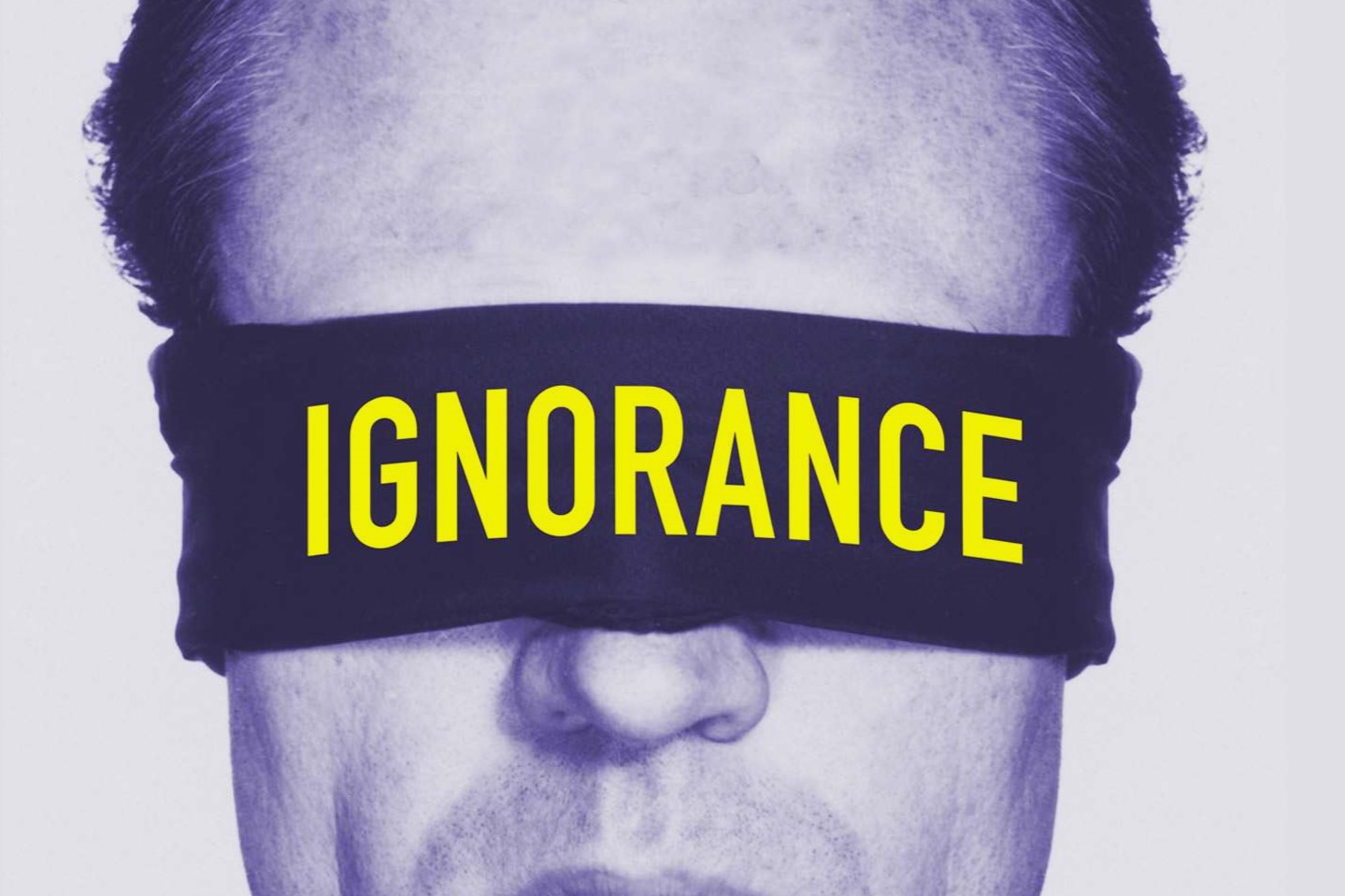Home>Psychology>The Surprising Meaning Behind Being Ignored


Psychology
The Surprising Meaning Behind Being Ignored
Published: January 10, 2024
Explore the psychology behind the surprising meaning of being ignored and its impact on mental health. Understand the deeper implications and how to cope with this experience.
(Many of the links in this article redirect to a specific reviewed product. Your purchase of these products through affiliate links helps to generate commission for Noodls.com, at no extra cost. Learn more)
Table of Contents
Introduction
Being ignored is a universal human experience that can evoke a wide range of emotions and reactions. Whether it occurs in personal relationships, social settings, or professional environments, the feeling of being disregarded can have a profound impact on an individual's psyche. The psychological implications of being ignored are complex and can manifest in various ways, influencing one's self-esteem, emotional well-being, and overall mental health.
The experience of being ignored can trigger feelings of rejection, loneliness, and unworthiness, leading to a sense of disconnection from others. It can also instigate a cascade of negative thoughts and emotions, such as self-doubt, frustration, and even anger. These psychological responses can be particularly distressing, as they challenge our fundamental need for social connection and validation.
Moreover, being ignored can significantly affect an individual's self-perception and identity. It may lead to questioning one's value and significance in the eyes of others, potentially eroding self-confidence and contributing to a diminished sense of self-worth. The emotional toll of being ignored can be particularly pronounced in situations where individuals are seeking acknowledgment, validation, or support, only to be met with silence or indifference.
In this article, we will delve into the multifaceted nature of being ignored, exploring its psychological, social, and evolutionary underpinnings. By examining the impact of being disregarded from various perspectives, we aim to shed light on the complexities of this experience and provide insights into coping strategies for navigating its effects. Understanding the underlying psychological mechanisms and interpersonal dynamics at play when one is ignored can empower individuals to address and manage these challenging situations with resilience and self-awareness.
The Psychological Impact of Being Ignored
The psychological impact of being ignored can be profound, eliciting a range of emotional and cognitive responses that shape an individual's mental landscape. When an individual experiences being ignored, it can trigger feelings of rejection, exclusion, and insignificance. These emotional reactions can stem from the fundamental human need for social connection and validation. The absence of acknowledgment or attention can lead to a sense of disconnection from others, challenging one's sense of belonging and acceptance within a social context.
Moreover, being ignored can evoke a cascade of negative thoughts and emotions, including self-doubt, frustration, and sadness. The lack of response or recognition can fuel internal narratives of unworthiness, leading individuals to question their value and significance in the eyes of others. This can erode self-esteem and contribute to a diminished sense of self-worth, impacting overall emotional well-being.
The psychological impact of being ignored is also intertwined with the concept of social pain. Research in social psychology has shown that the experience of being disregarded can activate neural pathways associated with physical pain, highlighting the deep emotional resonance of feeling ignored. This overlap between social and physical pain underscores the intensity of the psychological impact of being ignored and its potential to elicit distress on a fundamental level.
Furthermore, being ignored can influence an individual's self-perception and identity. It may lead to internalized beliefs of being unimportant or uninteresting, shaping how individuals view themselves in relation to others. This internalization of being ignored can contribute to a negative self-concept, affecting confidence and self-assurance in social interactions.
In addition, the psychological impact of being ignored is not limited to the immediate emotional response. It can also have long-term implications for mental health, potentially contributing to feelings of loneliness, anxiety, and depression. Persistent experiences of being ignored can create a pattern of negative reinforcement, reinforcing a belief in one's lack of social value and perpetuating a cycle of emotional distress.
Understanding the psychological impact of being ignored is crucial for fostering empathy and awareness in interpersonal interactions. By recognizing the profound emotional implications of being disregarded, individuals can cultivate a greater sensitivity to the experiences of others and strive to create inclusive and validating social environments.
In the next sections, we will further explore the social and evolutionary perspectives on being ignored, as well as strategies for coping with and navigating the complex psychological terrain that arises from this experience.
The Social and Interpersonal Ramifications of Being Ignored
The social and interpersonal ramifications of being ignored extend beyond individual psychological responses, encompassing broader dynamics within social relationships and group interactions. When an individual experiences being ignored in social settings, it can create ripple effects that influence the dynamics of communication, connection, and group cohesion.
At a relational level, being ignored can undermine the foundation of trust and mutual respect within interpersonal connections. It can signal a breakdown in communication and validation, leading to a sense of disconnection and alienation between individuals. In close relationships, such as romantic partnerships or friendships, being ignored can erode the sense of emotional intimacy and understanding, creating barriers to effective communication and mutual support.
Moreover, the social ramifications of being ignored are intertwined with the dynamics of inclusion and exclusion within social groups. When an individual is consistently overlooked or dismissed within a group setting, it can contribute to feelings of social ostracism and marginalization. This can have a profound impact on one's sense of belonging and acceptance within a broader social context, potentially leading to feelings of isolation and loneliness.
Furthermore, being ignored can influence the power dynamics within social interactions. In professional settings, being disregarded in meetings or collaborative endeavors can diminish one's perceived influence and contribution, potentially hindering career advancement and professional growth. Similarly, within social circles, being consistently ignored can lead to a diminished sense of social status and influence, affecting one's ability to shape group dynamics and decision-making processes.
The social and interpersonal ramifications of being ignored also extend to the broader cultural and societal context. In communities where certain voices are systematically marginalized or overlooked, the impact of being ignored can perpetuate broader patterns of inequality and social injustice. This can contribute to the amplification of power differentials and the silencing of marginalized perspectives, hindering the collective progress towards inclusivity and equity.
Understanding the social and interpersonal ramifications of being ignored underscores the importance of fostering inclusive and empathetic social environments. By recognizing the far-reaching implications of being disregarded, individuals and communities can strive to cultivate communication and relational dynamics that prioritize validation, respect, and inclusivity. Additionally, acknowledging the broader societal implications of being ignored can fuel efforts to address systemic inequalities and promote a culture of equitable representation and recognition for all voices.
The Evolutionary Perspective on Being Ignored
From an evolutionary standpoint, the experience of being ignored taps into fundamental mechanisms that have shaped human social behavior and survival strategies. Evolutionary psychology offers insights into the adaptive significance of social dynamics, shedding light on the deep-seated roots of the human response to being disregarded.
One key aspect of the evolutionary perspective on being ignored lies in the context of social belonging and group cohesion. Throughout human history, social connectedness and cooperation have been pivotal for survival and reproductive success. In ancestral environments, individuals relied on group cohesion for protection, resource sharing, and collective problem-solving. As a result, social exclusion or being ignored within the group could have posed significant threats to an individual's well-being and reproductive fitness.
Furthermore, the experience of being ignored may trigger primal instincts linked to social status and inclusion. In many social species, including humans, hierarchies and social status play a crucial role in resource access, mating opportunities, and overall reproductive success. Being ignored or overlooked within social contexts can evoke deep-seated fears of social rejection, which, from an evolutionary perspective, may have signaled a potential loss of access to vital resources and mating opportunities.
Moreover, the evolutionary lens on being ignored encompasses the concept of social signaling and attentional mechanisms. In ancestral environments, being attuned to social cues and signals was essential for navigating complex social dynamics and forming alliances. The experience of being ignored may activate attentional mechanisms geared towards detecting and interpreting social cues, as individuals instinctively seek to understand their social standing and relational dynamics within the group.
Additionally, the evolutionary perspective on being ignored underscores the role of emotional responses in shaping social behavior. The emotional pain associated with being ignored may have served as an adaptive signal, prompting individuals to seek reconnection and reaffirmation of social bonds. This emotional response could have facilitated the repair of social relationships and the restoration of social connectedness, ultimately contributing to group cohesion and collective survival.
By examining the evolutionary roots of the human response to being ignored, we gain a deeper understanding of the profound impact of social dynamics on human behavior and well-being. Recognizing the evolutionary underpinnings of being ignored can inform strategies for navigating these experiences in contemporary social contexts, fostering empathy, and promoting inclusive social environments that align with our evolved social nature.
Coping Strategies for Dealing with Being Ignored
Navigating the emotional and psychological impact of being ignored requires resilience and self-awareness. While the experience of being disregarded can be distressing, individuals can employ coping strategies to manage its effects and foster emotional well-being.
-
Self-Reflection and Emotional Awareness: Engaging in self-reflection and cultivating emotional awareness can empower individuals to acknowledge and process their feelings of being ignored. By recognizing and validating their emotional responses, individuals can gain insight into the underlying triggers and develop a greater understanding of their internal experiences.
-
Seeking Social Support: Connecting with supportive friends, family members, or mental health professionals can provide a valuable source of validation and empathy. Sharing one's feelings of being ignored with trusted individuals can offer a sense of validation and understanding, fostering emotional resilience and a strengthened sense of social connection.
-
Assertive Communication: Engaging in assertive communication can be instrumental in addressing instances of being ignored. Expressing one's feelings and concerns directly, yet respectfully, can facilitate open dialogue and potentially resolve misunderstandings or interpersonal conflicts that may contribute to the experience of being disregarded.
-
Cultivating Self-Validation: Fostering a sense of self-worth and validation from within can serve as a powerful coping strategy. Engaging in self-care practices, pursuing personal interests, and affirming one's strengths and accomplishments can bolster self-esteem and diminish the impact of external validation.
-
Exploring Coping Mechanisms: Engaging in activities that promote relaxation, mindfulness, and stress reduction can serve as effective coping mechanisms. Practices such as meditation, exercise, creative expression, and hobbies can provide a sense of solace and emotional regulation in the face of being ignored.
-
Setting Boundaries: Establishing clear boundaries in interpersonal relationships can help mitigate the impact of being ignored. Communicating personal boundaries and expectations for respectful communication can empower individuals to assert their needs and cultivate healthy, mutually respectful relationships.
-
Shifting Perspective: Engaging in cognitive reframing and perspective-shifting exercises can offer a different vantage point on the experience of being ignored. Viewing the situation from alternative perspectives and challenging negative thought patterns can promote resilience and emotional well-being.
-
Seeking Professional Guidance: In cases where the psychological impact of being ignored is particularly distressing or pervasive, seeking guidance from mental health professionals can provide valuable support. Therapeutic interventions, such as cognitive-behavioral therapy, can equip individuals with effective coping strategies and emotional regulation techniques.
By integrating these coping strategies into their lives, individuals can navigate the complexities of being ignored with resilience and self-compassion, fostering emotional well-being and adaptive responses to challenging social experiences.
Conclusion
In conclusion, the experience of being ignored encompasses intricate psychological, social, and evolutionary dimensions that shape individuals' emotional well-being and interpersonal dynamics. The psychological impact of being ignored delves into the profound emotional responses triggered by feelings of rejection, unworthiness, and disconnection. These responses can influence an individual's self-perception, identity, and long-term mental health, underscoring the far-reaching implications of this experience.
Moreover, the social and interpersonal ramifications of being ignored extend beyond individual psychological responses, encompassing broader dynamics within social relationships and group interactions. The erosion of trust, communication breakdown, and feelings of exclusion can permeate interpersonal connections, while broader societal implications highlight the interconnectedness of being ignored with systemic inequalities and social injustice.
From an evolutionary perspective, the experience of being ignored resonates with deep-seated mechanisms related to social belonging, attentional processes, and emotional signaling. Understanding the adaptive significance of social dynamics sheds light on the evolutionary roots of the human response to being ignored, emphasizing the fundamental role of social connectedness in human survival and well-being.
However, amidst the complexities of being ignored, individuals can employ coping strategies to navigate its effects and foster emotional resilience. From self-reflection and seeking social support to assertive communication and cultivating self-validation, these strategies empower individuals to manage the emotional impact of being ignored and promote adaptive responses to challenging social experiences.
By recognizing the multifaceted nature of being ignored and integrating coping strategies into their lives, individuals can foster empathy, resilience, and self-awareness in navigating the complexities of this experience. Furthermore, fostering inclusive and empathetic social environments, both on an individual and collective level, can contribute to creating spaces that prioritize validation, respect, and equitable representation for all voices.
Ultimately, by shedding light on the psychological, social, and evolutionary dimensions of being ignored, this exploration aims to foster greater understanding, empathy, and proactive strategies for addressing the complexities of this universal human experience.














